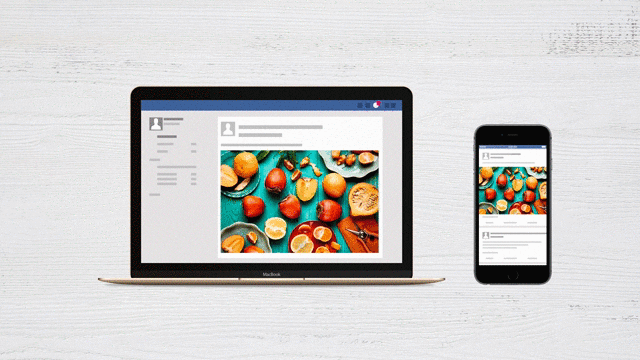
Facebook engagement is any action someone takes on your Facebook Page or one of your posts.
The most common examples are likes, comments, and shares, but it can also include checking in to your location or tagging you in a post.
Facebook engagement matters because it can help extend organic reach. First, engagement helps boost your News Feed placement based on the Facebook algorithm.
And second, likes and shares expose your posts to your audience’s extended network. DPNY Beach Hotel and Spa found that each like or share extended their reach to six or seven new people. That’s a lot of extra exposure at no extra cost.
Finally, engagement also indicates that your audience is, well, engaged. And an engaged audience that wants to interact with your brand is something every marketer should aim for.
Bonus: Download a free guide that teaches you how to turn Facebook traffic into sales in four simple steps using Hootsuite.
How to increase Facebook engagement: 17 tips that actually work
1. Teach, entertain, inform, or inspire
Your Facebook audience is not looking for a sales pitch, and they’re certainly not going to engage with one.
They want to engage with content that will make them smile, make them think, or improve their lives in some way.
Stuff Dutch People Like does a great job of informing non-Dutch folks (including the Netherlands’ huge expat population) about Dutch culture while also making people laugh.
Check out the engagement numbers on this informative but entertaining post: 1,300 likes and more than 1,000 shares.
To create content that connects with fans, you’ll need to…
2. Get to know your audience
What you find entertaining or inspiring is not relevant.
When you’re seeking engagement, it’s your audience’s wants and needs that matter.
And it’s tricky to understand what those wants and needs are unless you really understand who your audience is.
Facebook Page Insights provides a ton of useful information about your audience. Study this information carefully, and look for any unexpected details that could help you create a more meaningful connection with fans.
Terre Bleu lavender farm used Page Insights to research their audience and determine what kind of content their fans respond to most. They learned that customers liked informative content like recipes, as well as gorgeous photos of the lavender fields. They generally saw less engagement for posts about environmental issues.
Using that knowledge, they used a photo of the lavender field bursting with yellow dandelion blooms to talk about an issue they cared about—the importance of bees. It turned into one of their most-engaging posts, with nearly 1,000 shares.
Creating audience personas can also help you understand your followers better. It’s a great exercise to help ensure you put your followers’ needs front and center, and target your content to their needs.
3. Keep it short
The vast majority of people use Facebook mobile devices—a whopping 88 percent of them.
Facebook’s data shows that people scrolling through News Feed on their mobile devices spend just 1.7 seconds to consume an item of content.
Even people browsing on a computer only spend 2.5 seconds per content item.
Source: Facebook
The good news is that people can recall content after seeing it for just 0.25 seconds. But you need to act fast to get their attention.
Keep your post short and sweet to capture attention quickly and entice users to stop scrolling and engage.
4. Focus on quality
With people moving through content quickly, there’s no time for sub-par graphics, videos or text.
If you’re running out of original content to post, content curation can be a great way to share quality, informative content that gets your audience excited.
Quality doesn’t have to be complicated, or expensive. In fact, Facebook recommends keeping things simple with a consistent color scheme and recognizable images.
Which leads us to…
5. Use (great) images
Facebook posts that include a photo see higher-than-average engagement rates. Simple shots work well. Facebook suggests a product close-up or a customer photo.
You don’t need a fancy camera or photography equipment—your mobile phone is all you need to get started.
Ali Maffucci of Inspiralized uses foam board covered in contact paper to fake the look of a marble countertop for her Facebook photos. She shoots on her mobile phone, with a small tripod.
If you’re not confident in your photography skills, or you’d simply like to use photos taken by professionals, stock photography is a great option. Check out our list of free stock photo sites to find some great photo resources for your next post.
6. Make a video, or broadcast live
Video posts see even higher engagement than photo posts. Like photography, videography can be simple and inexpensive, and you can get started using your mobile phone.
Keep in mind that vertical video gives you the most screen real estate on mobile devices.
Live videos see the highest engagement of all, getting six times more interactions than regular video posts. Can’t think of a reason to go live? Get creative.
Mymuesli used a Facebook Live video to promote their muesli advent calendar. They set it up to mimic a live infomercial or shopping chanel show, with an added dose of humor to suit their brand personality.
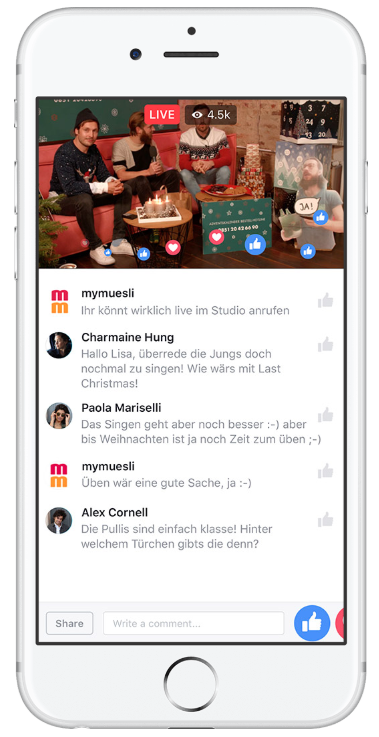
The video was viewed 34,000 times. Remember, we’re talking about muesli here. Still think your product’s not interesting enough to promote with a live video?
7. Ask a question
An interesting question is a great way to kick off an active comments thread. Here are some ideas to get you started.
- How do you [complete this action]?
- Why do you [like this event or brand]?
- Do you agree with [a notable statement, event, person, etc.]?
- What’s your favorite [fill in the blank]?
You could also ask fans for information about what kind of content they want to see from you. Then, give them what they ask for. This targeted content will inspire even more engagement.
As people answer your question, don’t forget to…
8. Respond to fans
If someone takes the time to comment on one of you posts, make sure to reply. No one likes being ignored, and fans who engage with your posts want you to engage in return.
Make sure you have a team in place to monitor and respond to all comments. Sometimes a simple comment back is all that’s needed. Sometimes more action is required. If someone posts a question that requires a customer service response, direct them to your CSR channels or have an appropriate person follow up.
If you use Facebook Messenger for your business, aim to get the Very Responsive badge. This shows fans that you respond quickly to fans’ questions and concerns.
9. Test everything
You know how the saying goes about what happens when you assume. On Facebook, there are ton of opportunities to learn what your fans like, and what they don’t.
The statistics say that video posts get the most engagement, but that might not be true for your particular brand. Or maybe your followers just can’t get enough 360-degree video.
Testing is such an important part of refining any marketing strategy that we’ve created a whole guide to show you how to do it right. Check out our step-by-step instructions on how to use social media for A/B testing.
10. Post consistently and at the right times
Since the Facebook News Feed is based on an algorithm, your fans will not necessarily see your content the moment it’s posted. Still, “when was this posted” is one of the signals for the Facebook algorithm. And Facebook itself says that you’re more likely to see engagement if you post when your fans are online.
You can learn when your audience is active on Facebook using Page Insights:
- From your Facebook Page, click Insights at the top of the screen
- In the left column, click Posts
- Click When Your fans Are Online
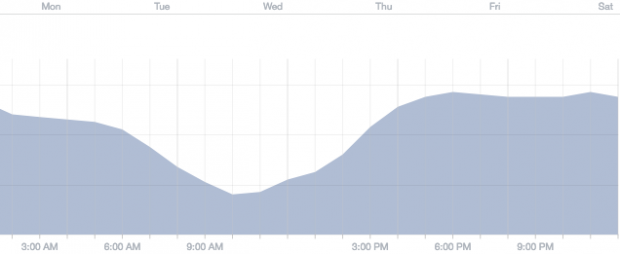
Times are shown in your local time zone. If your fans all seem to be active in the middle of the night, they’re likely in a different time zone from you. To confirm, click People in the left column, then scroll down to see the countries and cities in which your fans and followers live.
Of course, that doesn’t mean you need to get up in the middle of the night to post on Facebook. This is a great reason to schedule Facebook posts.
The most important thing is to post consistently, so your audiences comes to expect to see content from you regularly. Testing will help you determine how often you should past to get the best response from fans, but Facebook recommends posting at least two or three times per week.
11. Drive traffic from other sources
People who are already interacting with you on other channels are a great source of potential engagement. Make sure they know where to find you on Facebook.
Try adding a link to your Page on other social networks. Link to Facebook from your website and email signature. Include a Facebook plugin on your blog to highlight your latest posts, or embed a post directly in a blog post, like this:
Fans can like the post without leaving your blog, or click the comment button to transfer over to Facebook to join the conversation.
Don’t forget about offline materials. Include your Facebook page URL on your business cards, posters at events, and packing slips.
12. Get active in Facebook groups
Creating a Facebook group is a great way to get fans involved and engaged. More than 200 million people are members of Facebook groups that they consider to be meaningful. And those meaningful interactions in groups can create brand loyalty and lead to engagement on your Facebook page.
Joining other relevant Facebook groups is also a great way to connect with fellow entrepreneurs and thought leaders in your industry.
13. Use Facebook Stories
Like Instagram Stories, Facebook Stories appear at the very top of the News Feed. That’s great placement for drawing eyeballs to your content.
This informal way of sharing content allows you to post as often as you like, without worrying about overwhelming your fan’s News Feeds. And since people expect production quality to be lower on Stories, you can be more personal and in-the-moment to build a stronger personal connection with followers.
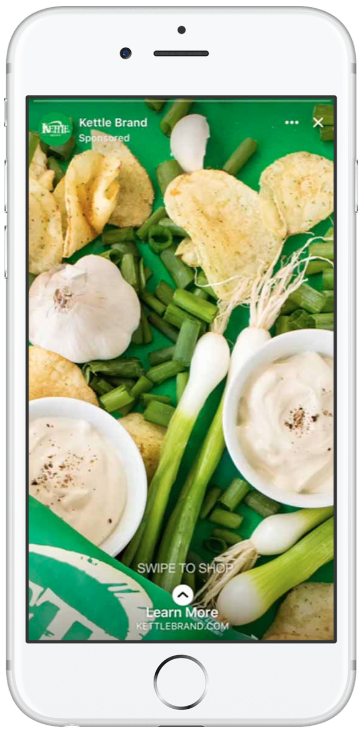
That stronger connection builds desire to see more of your content, making followers more likely to check out—and engage with—the content posted on your page. In an Ipsos survey of stories users commissioned by Facebook IQ, 62 percent of people said they became more interested in a brand or product after seeing it in a story.
14. Add a call-to-action button
A call-to-action button gives people Facebook engagement options beyond liking, sharing, and commenting.
- Your CTA button can ask viewers to:
- Book an appointment
- Contact you (including through Facebook Messenger)
- Watch a video
- Click through to your website
- Shop your products or see your offers
- Download your app or play your game
- Visit and join your Facebook Group
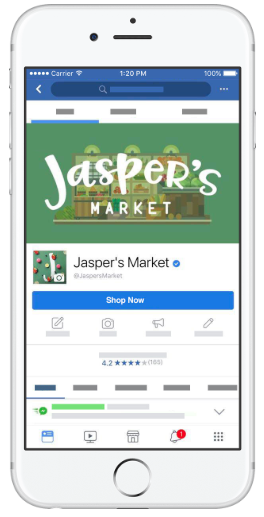
15. Get verified
People want to know who they’re talking to online. This applies to brands, too. A verified badge shows visitors that you’re the real deal and they can feel safe engaging with your posts.
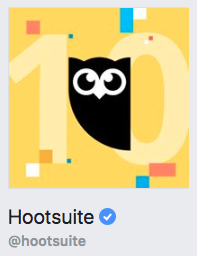
After all, no one wants to be the one to like or share a post from a fake page misrepresenting a brand.
16. Avoid engagement bait
When you’re hoping for likes and shares, it might be tempting ask for likes and shares. Don’t do it! Facebook considers this engagement bait and will penalize you by downranking your posts in the Facebook algorithm.
As mentioned above, it’s fine to ask a genuine question, or ask your followers for their opinion or feedback. You cross the line when you ask for a comment that doesn’t indicate any real thought or consideration. Here’s are some examples of engagement bait:
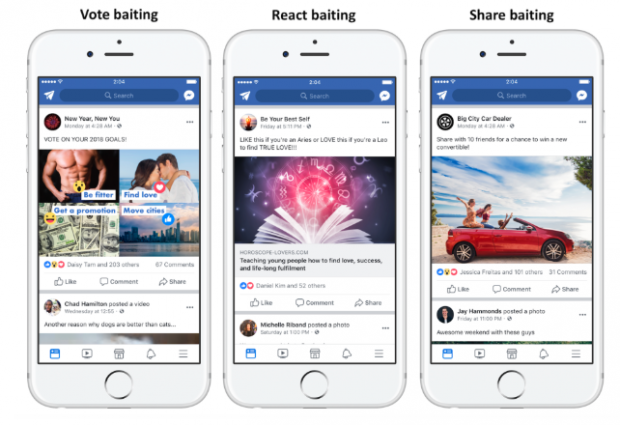
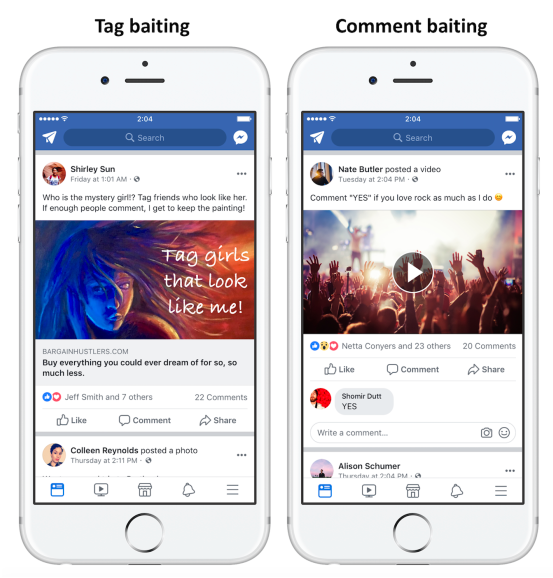
17. Boost your Facebook posts
Boosting a post is a simple form of Facebook advertising that allows you to get your post in front of more people, and thereby increase your chances of engagement.
Here’s a quick summary of how boosting works:
Want more details? Check out our full guide to using the Facebook Boost Post button.
Manage your Facebook presence alongside your other social media channels using Hootsuite. From a single dashboard you can schedule posts, share video, engage your audience, and measure the impact of your efforts. Try it free today.
The post 17 Simple Ways to Increase Facebook Engagement appeared first on Hootsuite Social Media Management.